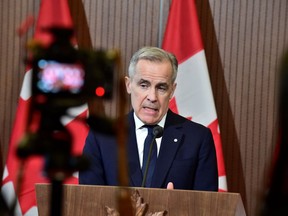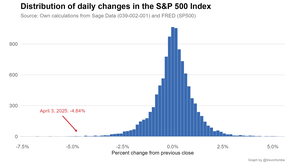Canada is no longer an outlier in its Trump fight, which is bad news for Mark Carney

Article content
First Reading is a Canadian politics newsletter that throughout the 2025 election will be a daily digest of campaign goings-on, all curated by the National Post’s own Tristin Hopper. To get an early version sent directly to your inbox, sign up here.
Article content
Article content
TOP STORY
With U.S. President Donald Trump seeming to back off his threats against Canada, the Liberals may have lost their single most potent campaign issue.
Advertisement 2
Article content
When the Liberals first began experiencing a polling resurgence under new leader Mark Carney, Canada’s most pressing political issue was the economic threat from the U.S.
A March 24 Leger poll was one of the first major polls to put Carney on track for a majority, and it partially identified Trump as the reason.
After years of the Liberals being hammered in polls that ranked affordability as Canadians’ top political concern, Leger found that this had suddenly been eclipsed by fears of Trump. When asked the “most important question in this federal election,” 36 per cent of respondents said it was finding a prime minister to “deal with President Trump and aggressive U.S. trade actions.”
An Abacus Data poll from around the same time found that while voters were still skeptical of Liberal management of affordability and the economy, it was a different story when it came to the Trump trade war.
When asked which party leader would be “best able to deal with any of the effects of Trump,” Carney took the top spot at 36 per cent to Conservative Leader Pierre Poilievre’s 34 per cent.
Article content
Advertisement 3
Article content
In a March 30 Ipsos Reid poll, Carney similarly ranked as the top choice for prime minister, with respondents citing his Trump-handling skills. On the question of which party leader could “stand up to President Trump,” Carney got 40 per cent to Poilievre’s 28 per cent.
At the time of Carney’s March 14 swearing-in, Canada was arguably the single most conspicuous target of tariffs imposed by the Trump administration.
Although Mexico was also within the crosshairs of the first major Trump tariffs, the premise was flimsiest when it came to Canada.
Recommended from Editorial
-

Conservatives in the lead for first time in federal campaign, new poll shows
-

OnlyFans creator who joined NDP campaign trail dropped over ‘disrespectful’ Holocaust video
The White House justified the trade war by citing Canada as a centre of “unchecked drug trafficking” – a claim soon contradicted by its own security agencies, which didn’t even mention Canada as a drug supplier in a March threat assessment.
All the while, Trump was repeatedly threatening Canada with annexation.
But now, the focus is decidedly off Canada as Trump widened his trade war on Wednesday to include more than 200 additional countries — many of which are being hit even harder than Canada. Sri Lanka, for one, was tariffed at 44 per cent.
Advertisement 4
Article content
While Canada’s prior tariffs remain, it was notably left off the new list — a fact that didn’t make it into Carney’s official video statement responding to the Trump announcement.
“We are going to fight these new tariffs with countermeasures,” Carney said in a video address from Ottawa, where he had gathered with his cabinet in apparent anticipation of new U.S. tariffs.
In a longer statement, Carney would clarify that he was referring not to tariffs specifically laid against Canada on Wednesday, but which would have an indirect effect on Canada by damaging the “international trading system.”
On Wednesday, Liberal candidates continued to stress the threat of Trump, even in the wake of the reprieve. “Donald Trump remains the central threat to Canada.… Mark Carney helped Canada avoid the worst and is the only person who will protect our economy and defend our sovereignty,” reads a Wednesday post to X by Toronto Centre Liberal candidate Evan Solomon.
Trump has also backed off his usual annexation threats. The last time he called Canada the 51st statement was nearly a month ago on March 11, when he was reacting to a threat from Ontario Premier Doug Ford to block electricity exports to the U.S.
Advertisement 5
Article content
“The only thing that makes sense is for Canada to become our cherished Fifty First State. This would make all Tariffs, and everything else, totally disappear,” he wrote.
In the weeks since, Trump has barely mentioned Canada, aside from a glowing review of his first phone call with Carney.
“It was an extremely productive call, we agree on many things, and will be meeting immediately after Canada’s upcoming Election to work on elements of Politics, Business, and all other factors, that will end up being great for both the United States of America and Canada,” he wrote.
Not only was the post devoid of annexation threats, but it marked one of the few times that Trump has referred to a senior Canadian political figure without belittling them. Carney’s predecessor Justin Trudeau was frequently mocked by Trump as “governor” — a reference to Trump’s 51st state rhetoric.
The U.S. president has also expressed his distaste for Carney’s chief opponent in the federal election, referring to Poilievre as “not a MAGA guy” who was making a “big mistake” by speaking out against U.S. tariff policy.
Advertisement 6
Article content
A wide-ranging Innovative Research poll released this week was the first since the start of the election campaign to put the Conservatives in the lead against the Liberals (38 per cent Tory to 37 per cent Liberal).
The poll found that Canadians still favoured Carney as the leading prime minister to deal with Trump. When respondents were asked who was “best equipped to handle Canada-U.S. relations during Trump’s renewed presidency,” 43 per cent picked Carney to just 33 per cent picking Poilievre.
GAFFETERIA
The NDP has leaned hard into anti-Israel rhetoric this election, a trend that took its most bizarre turn this week when NDP Leader Jagmeet Singh appeared in a video with a keffiyeh-wearing anti-Israel activist whose day job includes doing X-rated content on OnlyFans under the name Jessica Wetz. The NDP ended up distancing themselves from Singh’s video with Wetz, but not because of the OnlyFans connection or even that it falsely claims that Canada sells arms to Israel (Singh himself voted for a moratorium to block Canadian military exports to Israel). Rather, the party took issue with past comments by Wetz in which she compared Israel to Nazi Germany.

Get all of these insights and more into your inbox by signing up for the First Reading newsletter here.
Article content


